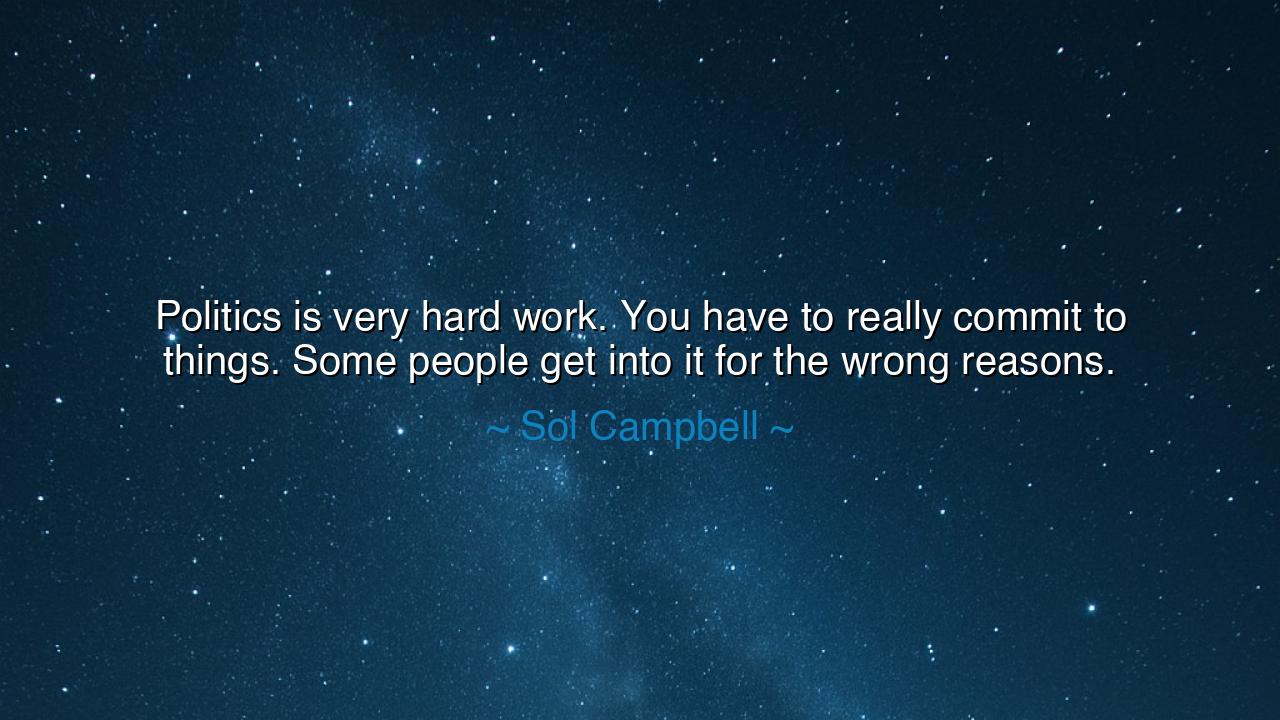
Politics is very hard work. You have to really commit to things.
Politics is very hard work. You have to really commit to things. Some people get into it for the wrong reasons.






"Politics is very hard work. You have to really commit to things. Some people get into it for the wrong reasons." Thus declared Sol Campbell, a warrior of the field who also glimpsed the battlefield of governance. His words uncover the burden that many forget: that politics is not a stage for vanity, but a labor that demands sweat, sacrifice, and resolve. To commit is to bind oneself to the service of others, and to bear weight not for one’s own glory, but for the common good.
The ancients understood this struggle well. In the republic of Rome, the consul’s seat was not a throne of ease but a place of ceaseless work. There, men rose not by accident but by devotion to the state. Yet Rome also saw how corruption crept in when men pursued politics not for duty but for ambition. When honor was replaced by hunger for wealth and power, the republic began to decay, undone by those who entered for the wrong reasons.
Consider the story of Abraham Lincoln. He entered politics not to adorn himself with titles, but to commit to the cause of unity and justice. The road was cruel—mocked, defeated, and burdened by endless toil—but he endured. His greatness came not from ease, but from the relentless work of guiding a nation through its darkest hour. He shows that only those who enter with pure reasons can bear the weight without breaking.
Yet history also warns us of the opposite: men like Nero, who sought power for pleasure, and left their people to suffer under ruin. They reveal the danger Campbell spoke of—those who see politics as a stage for vanity, rather than a burden of service. Such rulers rise swiftly but fall with equal speed, leaving behind only ashes of betrayal.
So let this truth endure: politics is no game for the idle or the selfish. It is a sacred work, demanding full commitment, endless labor, and pure reasons. Let those who enter ask not what they may gain, but what they may give. For the one who seeks glory alone will stumble, but the one who serves with sincerity will endure as a steward of the people, remembered not for vanity, but for sacrifice.






UGUser Google
Coming from a high-performance field doesn’t automatically translate to governing. What competencies should outsiders demonstrate before seeking office—policy literacy, negotiation chops, coalition building? Would a formal apprenticeship—say, a year working with city agencies or community boards—make sense as a norm? I’m also curious about scale: is it wiser to begin at school boards and councils before national roles? Please weigh in on whether celebrity platforms help mobilize civic energy or distort attention away from patient, unglamorous tasks that ultimately determine outcomes.
TH09_Nguyen Thanh Hoa
I worry about sustainability. Constant pressure, public scrutiny, and long hours can hollow people out. If we keep insisting on near-martyr levels of effort, do we discourage diverse candidates—parents, caregivers, people with disabilities—from running? What would a humane workload look like in modern governance: protected downtime, mental health support, transparent staffing ratios, clear off-ramps for burnout? I’d appreciate examples of practices that let officials serve intensely without sacrificing well-being. Is there evidence that healthier schedules actually improve policy quality and reduce scandals?
HNHieu Nguyen
The phrase “wrong reasons” intrigues me. In real life, motives are mixed: ambition, ideals, ego, duty. At what point does ambition tip from useful fuel into a public risk? Should we tolerate some self-interest if results are broadly beneficial, or does that moral compromise erode institutions over time? I’d love a perspective that connects ethics to design: campaign finance limits, asset disclosures, lobbying rules, and cooling-off periods. Which structural guardrails most effectively align personal incentives with the common good without deterring talented newcomers?
HNThao Huyen Nguyen
From a citizen’s perspective, how do we evaluate whether a candidate’s dedication is real rather than performative? What signals should we look for—time spent on constituency casework, fluency with budgets, willingness to take unpopular but principled votes? Could you propose a simple checklist a voter can use during a campaign season to differentiate genuine public service from branding? I’m also curious whether sustained, boring competence should outweigh charismatic speech. If I have only one hour to research a local contender, what sources and questions would best expose their true priorities?